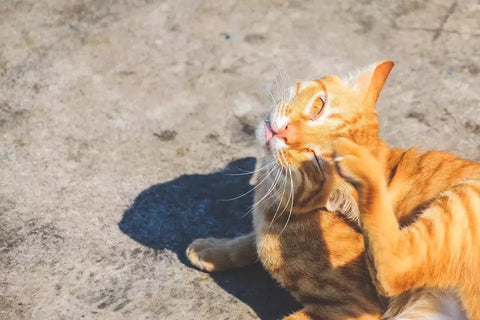As a pet parent, it is very important that you recognize the diseases that occur with your cats. Some cat diseases to watch out for can be treated at home, while some can be life-threatening.
In this article, we’ll talk about the top cat diseases that are more dangerous & occur very commonly, and what you can do to make your helpless kitty feel better.
Kidney disease
One of the most common cat diseases to watch out for is kidney disease. Kidney diseases in cats are common and can happen mostly in senior cats and long-haired cat breeds like the Persians, Munchkins, Angoras, Scottish Folds, and a lot more.
"Just when you thought distemper can only occur in dogs, it can also occur in cats. Feline Panleukopenia is also known as feline distemper."
As remarked by the VCA Animal Hospital, your cat’s kidneys have many functions (just like ours and your dog’s!). Kidneys essentially function to eliminate waste products from the bloodstream, manage the levels of specific fundamental minerals such as potassium and sodium, and produce urine.
If your cat has kidney disease, they will begin exhibiting the following symptoms:
- dry skin
- dull skin
- sudden weight loss
- drooling
- bad breath
- thirsty
- increased urination
Just like kidney diseases in dogs, there are different types of kidney diseases in cats, too. As WebMD mentions, kidney diseases in dogs can be classified into two types: acute and chronic.
Acute kidney diseases happen so suddenly, in just a span of days or weeks, and happens in all cat ages. Acute kidney diseases in cats can be caused by:
- ingestion of poison or harmful substances, toxic plants, human medications, household cleaning products
- trauma in the bladder or pelvis
- kidney infections
- blockages in the kidney
- shock from losing too much blood
- constant dehydration
- heatstroke
If renal failure is treated immediately, it can be curbed. It is chronic kidney disease that can be a lot of trouble as it is harder to treat. Chronic kidney diseases in cats occur commonly in adult & senior ones and can develop later in life. The worst thing about chronic kidney diseases is that you’ll never know the cause of it so treatment will be difficult.
Treatment and Management: Long-term treatment and management are needed for kidney disease in cats. It includes the introduction of renal diets, ensuring proper hydration all the time, restricting intake of too much protein, and nutritional management to slow down the development of the kidney disease of your furbaby and help curb the symptoms.
As kidney disease symptoms include an increase in your cat’s urination, it is also best to consider using high-quality pee pads like that of Pet Parents® Pawtect® Pads. If your cat uses the litter box and has been frequently urinating, pee pads can be placed under litter boxes to catch any intended “misses”.
Pet Parents® Pawtect® Pads are made with an odor-eliminating feature that lightens the unpleasant smell of your cat’s pee. These pads are also very handy when your furbaby becomes extra messy and ends up trailing or spilling over the litter. Pawtect® Pads have WickQuick®, an anti-tracking fabric blend that holds in anything and does not allow any messes to be tracked by your kitty’s paws into your house. What a life-saver!
Rabies
Rabies is a viral infection that is spread by an infected animal’s bite or saliva and yes, it does occur in cats, too. In fact, according to the Centers for Disease Control and Prevention (CDC), a great number of cats are more rabid than dogs as cats interact more often between humans, stray animals, and the wild - and this is where rabies is primarily transmitted. Rabies infection is one of the most life-threatening cat diseases to watch out for.
If your cat has been bitten or scratched by an animal you suspect has rabies, here are the symptoms to look for to know if your cat has been infected:
- sudden aggression
- changes in behavior
- fever
- excessive drooling
- hyperactivity
- muscle spasms
- decreased appetite or no appetite at all
- weight loss
These symptoms can vary, may not develop on your cat immediately, and may take months for your cat to exhibit. It is best to consult your vet immediately.
Treatment and Management: Note that rabies infection can be deadly. To prevent your cat from acquiring rabies, it is best that you keep their rabies vaccinations updated and not allow them to interact with stray animals. Anti-rabies vaccines also don’t just protect your cat in case they get bitten. It will also protect them if they bite somebody else.

Feline panleukopenia
Just when you thought distemper can only occur in dogs, it can also occur in cats. Feline Panleukopenia is also known as feline distemper. The distemper virus can easily be transmitted through body fluids, feces, fleas, and any contaminated items like food bowls, water bowls, chew toys, etc.
Feline distemper is very deadly and one of the cat diseases to watch out for, as it can instantly kill one day after your cat gets infected. Symptoms of feline distemper include:
- loss of appetite
- depression
- weakness
- lethargy
- vomiting
- anemia
- diarrhea
- bloody stools
Treatment and Management: Keep your cat indoors and always under your supervision to prevent them from being in direct contact with infected animals and contaminated objects.
Feline immunodeficiency virus (FIV)
Feline immunodeficiency virus is like the HIV version of cats. It is easily transmitted through bites wounds, and when it enters your cat’s bloodstream, it attacks the immune system. FIV is also considered to be a slow virus. It develops very slowly and won’t exhibit its symptoms immediately. Your infected cat will look normal and feel okay for many years as the virus slowly impairs the body’s immune system.
Some symptoms of FIV includes:
- skin diseases
- dry coat
- loss of appetite
- diarrhea
Treatment and Management Just like rabies, to prevent your cat from acquiring FIV, keep their vaccinations up-to-date, keep them indoors, and keep them away from stray cats.
Heartworm
Heartworm is a disease that greatly affects your cat’s lungs and heart. Your cat can acquire heartworm usually through mosquito bites. According to The American Heartworm Society, heartworms are more difficult to be detected in cats than in dogs. And unlike dogs, no drug is available yet to treat heartworm infections in cats.
Symptoms of heartworm infection in cats include:
- vomiting
- coughing
- weight loss
- seizures
- collapse
Treatment and Management: The only treatment option for heartworm infection in cats is by sustaining preventatives (pills, shots, etc) and maintaining a healthy lifestyle for your furbaby.
What more can you do
While it is true that some of our pets’ diseases can be out of our control, you can still do your best to keep your cat healthy and prevent them from acquiring these life-threatening cat diseases to watch out for.
Provide a healthy diet. See to it that you provide a healthy diet and a healthy lifestyle for your feline best friend. A healthy diet includes the basic nutrients your cat needs, depending on their age, medical condition, and other special needs. Also, make sure that your cat remains active and gets enough exercise.
Supervise. One important thing you can do to keep your furbaby safe from the cat diseases mentioned above is by making sure that they remain inside your property and under your supervision. When this is made possible, the risks of your cat acquiring communicable diseases are lessened as they will have no interaction with stray cays and other stray animals.
Have your kitty wear cat diapers. Some cat owners sometimes let their cats go outside for the so they don’t need a litter box and saving themselves the trouble in case their furbaby pees outside the litter box. This is where Pet Parents® Washable Cat Diapers come in handy. These cat diapers are specifically designed to prevent accidents from turning into messes, that will make not only your house but also your pet happy, inside.
Pet Parents® Washable Cat Diapers are super absorbent with a sewn-in pad that can keep in both fecal and urinary messes from your cat. These cat diapers are also super comfy! Made from a soft, non-abrasive WickQuick® proprietary fabric that wicks away liquid fast, it helps prevent diaper rash and urine burns from happening to your cat.
And to top it all, maintain regular checkups with your cat’s vet so any chances of your cat getting sick will be diagnosed early and will be given proper treatment.
"Pet Parents® Pawtect® Pads is made with an odor-eliminating feature that lightens the unpleasant smell of your cat’s pee."
These cat diseases to watch out for can be prevented, helping your cat make the most out of their nine lives!









